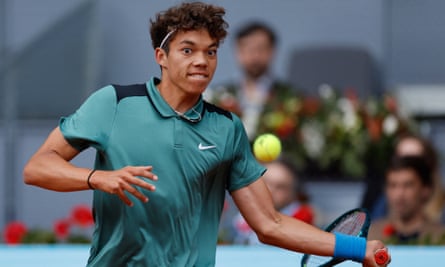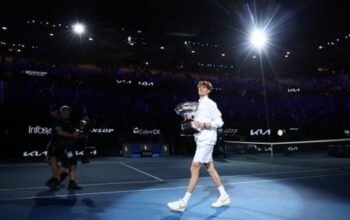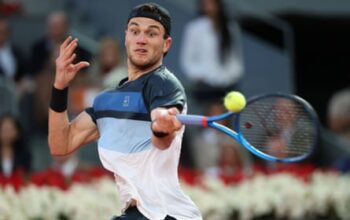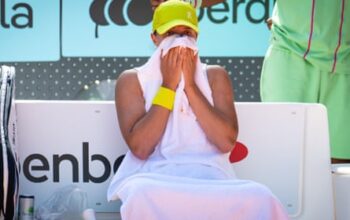As Rafael Nadal prepared to enter the Estadio Manolo Santana for what could have been his final match on home soil, like every one of his matches this week could be, much of the 12,400 capacity crowd filled out the walkway around the stadium. He emerged to a prolonged standing ovation, necks craning to catch a fleeting glimpse of his entrance.
It was a moment. The start of a final homecoming for the greatest athlete from these lands, but it remains to be seen if he has more to give. Against an extremely young opponent out of his depth, Nadal moved into the second round of the Madrid Open with efficiency and ease, dismantling Darwin Blanch – 21 years his junior – 6-1, 6-0 in an hour. “At least two more days,” said Nadal afterwards. “In the end, I’m happy.”
Not only had Nadal plainly confirmed before his match that this would be the last time he competes in the Spanish capital as a professional tennis player, he had described his decision to compete in Madrid as an “emotional” one. If Roland Garros began today, he noted, he would not be on court. He was here to say goodbye.
This was not merely a significant day for the four-time champion, though. Across the net, at just 16 years old in his second ever ATP tournament, Blanch found himself staring down one of the greats of his time. Blanch’s nerves were immediately clear as he sprayed errors even as they warmed up at half pace.
Throughout Nadal’s career, the 22-time grand slam champion has often kept his own expectations low only to draw on his endless reserves of inner strength and skill to beat the odds. But, having competed in just two tournaments since the 2023 Australian Open due to numerous injuries, his ranking now down to 512, these days his physical limitations are very clear. Still, despite his adapted, less dynamic service motion and reduced mobility, Nadal looked comfortable as he worked Blanch over like he has done to hundreds of opponents on the surface.
Although in the top 10 in the junior rankings, Blanch is ranked No 1,028 on the ATP rankings and right at the beginning of his professional journey. It was clear he was also playing several levels above his current capabilities. Blanch showed considerable firepower on his lefty first serve, but he was overwhelmed by Nadal’s depth, weight of shot, and consistency in the rallies. Nadal forced the youngster far behind the baseline with his heavy top-spin forehand, peppering the American’s vulnerable backhand and grinding him down, and he did not hesitate to unload on the many short balls Blanch presented. As the match endured, Nadal’s service speeds improved notably.
“He is a very young player and has a great journey ahead of him,” said Nadal. “He has very powerful strokes. I believe that what he lacks is consistency. I have done well and I’m happy, it gives me the opportunity to play one more day in Madrid, which means a lot to me.”

It was a solid start. While Nadal’s body may be broken and bruised, in constant pain after more than 20 years of painstakingly building his legacy, he noted, rightfully, before the match that things can change quickly in this sport. He may be here to bid his home crowd farewell, but is also here to work with what he has, to train, compete and play every single point with the discipline that has defined his career. Most of all, he is playing to see if, by the end of the clay season, one last miracle is still possible.
after newsletter promotion
Nadal will face Alex de Minaur next, the 10th seed and his conqueror last week in Barcelona; another opportunity to test his level against the best.
“Last week it couldn’t be,” said Nadal. “This week will surely be very difficult. I’m going to have the opportunity to play, which is almost a gift, so I’m happy to get on the court again. I’m going to try to be competitive as much as I can. He is a difficult player playing at a very high level and I think the altitude favours him a little more. But I want to continue improving as much as possible in every way and for me it is an opportunity. I am going to do everything that is possible.”
Meanwhile, Coco Gauff, the No 3 seed, eased into the women’s third round with a 6-0, 6-0 win over Arantxa Rus, marking the first “double bagel” of her young career. Naomi Osaka, however, was unable to build more momentum in her comeback from maternity leave despite a considerable fight as she fell 6-2, 4-6, 7-5 to Liudmila Samsonova, the 17th seed, in the second round.


